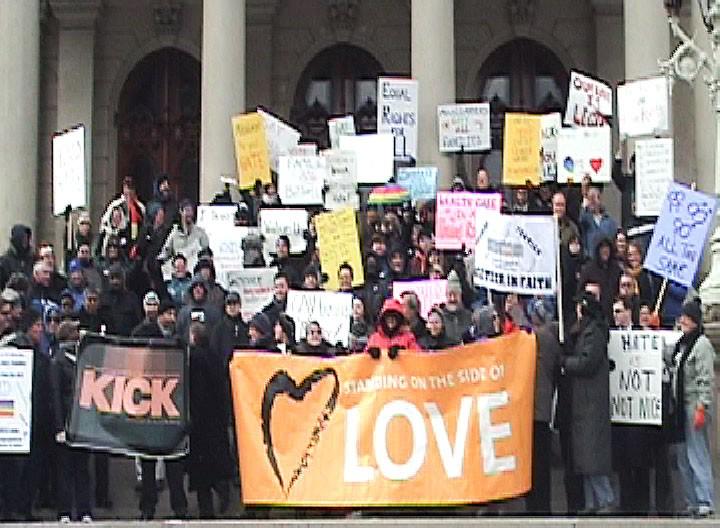Benefit ban draws protests

Courtesy Photo / Colette Seguin Beighley Protestors crowded the steps of the Capitol building in Lansing yesterday to protest the domestic partnership benefits ban passed into law by Gov. Rick Snyder late last month.
Jan 19, 2012
Students and faculty from Grand Valley State University went to Lansing Wednesday in protest of Michigan’s domestic partner benefits ban, which prohibits all state and city employers from extending taxpayer paid health benefits to same-sex and domestic partners.
The bill, sponsored by Rep. Dave Agema (R-Grandville), was signed into law by Gov. Rick Snyder late last month.
“I delivered a message to Rep. Agema today,” said Vince Panozzo, a GVSU senior and member of the LGBT community. “I told his intern that I understand that Michigan Voters decided in 2004 to define marriage between a man and a woman, but I did not understand why he felt it was necessary to pass legislation to explicitly make it illegal for state and city departments to not allow domestic partnerships for their employees.”
A non-profit group called Affirmations, a metro Detroit-based community center for LGBT people and their allies, organized the protest through Facebook with the help from a host of other LGBT community centers in Michigan that helped sponsor the event.
Panozzo said about 130 people attended the rally, which started at noon, including speakers from the aforementioned community centers and organizations.
“While the amount of attendees in the rally wasn’t as large as I had hoped and expected for, I feel as though it is only the beginning of a stronger protest in the months to come,” Panozzo said.
However, Michigan’s 15 public universities, including GVSU, remain unaffected by the law due to the constitutional autonomy of universities. Likewise, members of classified state civil service are also not confined to the terms of the ban, since the constitution gives the Michigan Civil Service Commission responsibility for setting rates of compensation and regulating all conditions of employment in the classified service.
“The ban on household/partner benefits does not apply to Michigan’s public unversities or to Michigan’s civil service employees,” said Matt McLogan, vice president of public relations at GVSU. “Gov. Snyder made this clear when he signed the benefit ban legislation last month.”
Though the bill does not directly affect faculty members at GVSU, Panozzo still thinks the ripple effect of the ban should sway individuals to remain vigilant about fighting the new law.
“I made a stand to show Rep. Agema, Gov. Snyder and the rest of our state government that inequality is not something that Michiganders will put up with anymore,” Panozzo said. “Even though this legislation does not affect the staff of GVSU — since universities have their own constitutions to protect their employees — this legislation still hurts the families of GVSU students. Therefore, this law and this rally does affect GVSU’s community and the rest of the state.”
Stronger protest is just on the horizon, as the American Civil Liberties Union of Michigan filed a federal lawsuit on Jan. 5 asking the court to strike down the law on the grounds that it is unconstitutional.
“Although justified by the governor as a cost-cutting measure, the numbers don’t hold up,” wrote Kary L. Moss, executive director of the ALCU of Michigan, in a press release. “The reality is that the legislation was intended to disenfranchise LGBT families. When a key policy priority has been to attract top talent and resources to the state, our elected officials have sent a clear message that Michigan is out of step with the kinds of public policies that attract talent and grow our economy.”
Colette Seguin Beighly, director of GVSU’s LGBT Resource Center, attended yesterday’s rally, and said she thinks the protest is a testament to community.
“Today’s rally was an excellent opportunity for students to see a community response to this anti-gay legislation,” Seguin Beighly said. “Students were able to hear from LGBT leaders around the state as LGBT community centers organize against this discriminatory law.”





















